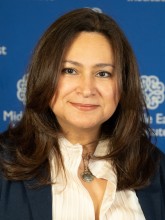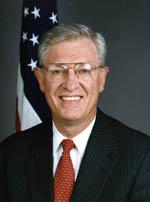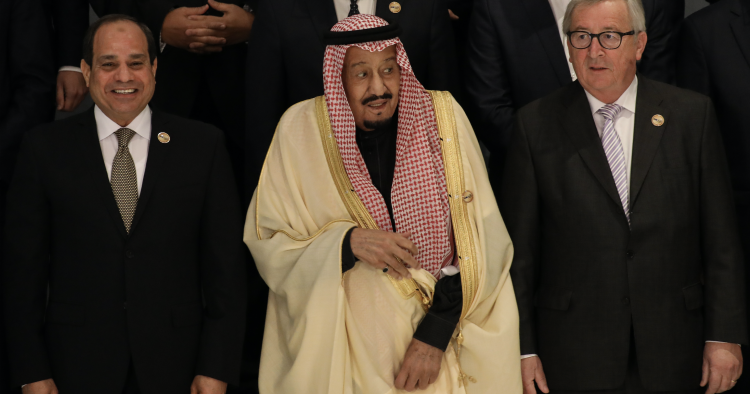In this week's Monday Briefing, contributors Mirette F. Mabrouk, Gerald Feierstein, Marvin G. Weinbaum, Przemysław Osiewicz, Grace Wermenbol, and W. Robert Pearson provide analysis on recent and upcoming events including the EU-Arab League summit, the progress in US-Taliban talks, challenges to Israeli Prime Minister Benjamin Netanyahu's power, consequences of the Kashmir attack, and Turkey's next steps in Syria.
Egypt hosts first EU-Arab League summit
Mirette F. Mabrouk
Senior Fellow, Director of Egypt program

The title of the first joint EU-Arab League summit in the Egyptian Red Sea resort of Sharm el-Sheikh is Investing in Stability. While an officially Arab League and not solely Egyptian undertaking, it’s an excellent summation of Egypt’s current relationship with the EU. Egypt needs investment and technical cooperation while the EU needs advantageous investment terms, regional stability, and most importantly, Egypt’s help in staunching the flow of refugees to the EU.
The conference was a major event on any scale, bringing together representatives from 50 states, including 24 Arab and EU leaders, among them European Council President Donald Tusk, European Commission President Jean-Claude Juncker, Saudi Arabia’s King Salman, UK Prime Minister Theresa May, and German Chancellor Angela Merkel.
While the agenda was impressive – dedicated to addressing regional crises, among them Yemen, Syria, and Libya – it must have been difficult to tackle. For one, there was the sheer scope: multilateralism and the rules-based global order, trade and investment, migration, climate change, and security were all on the table. There was also the fact that many of the participants held differing positions on these issues. The conference hall held not one but several metaphorical elephants. Russia and Iran, both major players in Syria, were not present, and Saudi Arabia’s position on Yemen has come under heavy fire from the Europeans. There were discussions about Brexit, with all its attending uncertainties, on the sidelines as well. And while recent criticism of Egypt’s human rights record was nowhere to be seen on the agenda, it did surface in the form of a question posed by a journalist to Egyptian President Abdel Fattah el-Sissi, who responded by asking that the EU “not impose” views on Egypt.
No such imposition appears to be on the horizon. The continued emphasis was on cooperation to tackle common challenges to the mutual benefit of all concerned. Those challenges aren’t limited to the Arab region. The EU has been battered by fractious populations at home, a rising tide of right-wing politics fueled in no small part by refugees, the potential return of ISIS fighters, and the uncertainty brought to bear by Brexit. Cooperation between the EU and Arab region, which together represent over one-fifth of the world’s population, is a pragmatic necessity.
Saudi Arabia’s new ambassador
Gerald Feierstein
Senior Vice President

The Saudi announcement on Friday, Feb. 22 that Princess Reema bint Bandar bin Sultan would be the kingdom’s first woman to serve as ambassador to the United States was long speculated. Made in the name of the “deputy king,” Mohammed bin Salman (MBS), the announcement also reported that the current ambassador and brother of the crown prince, Khalid bin Salman, will serve as MBS’s deputy at the Ministry of Defense. In that role, Khalid can be expected to provide day-to-day guidance to the Saudi military, solidifying his brother’s control of the security agenda.
The public response to the appointment of Princess Reema as ambassador has been generally positive. The 44-year-old spent the bulk of her early life in the U.S. during her father’s time as ambassador to the U.S, and she is a graduate of George Washington University. At home, she has been a leading advocate of women’s social and economic empowerment. In 2018, MBS dispatched her to the U.S. to highlight the social reforms underway in the kingdom, including opening the door to women’s participation in athletic events both as spectators and as participants.
Despite the overall positive reception to her appointment, Princess Reema will face an uphill battle repairing Saudi Arabia’s tarnished image in public and on the Hill. Her predecessor has been implicated with his brother in the murder of prominent U.S.-based Saudi journalist Jamal Khashoggi. Congressional frustration with the Saudi role in the four-year Yemeni civil conflict is reaching a crescendo as members of Congress demand the administration end its support for the Saudi intervention. Charm alone is unlikely to reverse the negative dynamic in U.S.-Saudi relations. The new ambassador will be expected to channel back to Riyadh the need for the Saudi leadership to re-think major policy initiatives, including its approach on Yemen and its management of Saudi Arabia’s human rights and civil liberties agendas.
Mullah Baradar joins US-Taliban talks
Marvin G. Weinbaum
Director for Afghanistan and Pakistan Studies

With Mullah Abdul Ghani Baradar present in Doha for today’s resumption of talks with U.S. representatives led by Zalmay Khalilzad, hopes have risen for progress in finding a political solution to the Afghan conflict. This optimism rests on the belief that Baradar, at one time second in command of the Taliban, will serve as a strong advocate of a negotiated outcome and add an authoritative voice to the Taliban delegation. But Baradar’s possible contribution is clouded by the fact that he was not initially included in the Taliban negotiating team, and uncertainty over what his role, if any, will be in the formal talks. Until last fall Baradar was not even a free man, having had been incarcerated for more than eight years by Pakistan’s Inter-Services Intelligence after he independently established contacts with the Afghan government. He was released only last October at the U.S.’s request.
There is reason to doubt Baradar’s relevance today. During his long incarceration, other leaders gained influence within the Taliban, and it is unclear whether Baradar still holds the respect of commanders and fighters he once enjoyed. There were earlier reports that while captive he suffered serious mental deterioration. But what most makes Baradar likely a figure of the past is that most Taliban senior leaders now accept as a viable strategy what Baradar had seemed to advocate earlier. They are prepared to explore whether the Taliban can achieve through negotiations what it has aimed to accomplish militarily. While appearing pragmatic in agreeing to negotiate with the U.S., there is little evidence that the Taliban is ready to agree to a ceasefire or to compromise on its core principles linked to the creation of a state operating on the basis of sharia.
Common challenges at EU-Arab League summit
Przemysław Osiewicz
Visiting Fellow

The first ever EU-Arab League summit could be more significant than European and Arab leaders expect. As President of the European Council Donald Tusk stressed during the opening ceremony, “being closer is in fact not a choice but a must.” As a quick glance at a map of the Mediterranean makes clear, both the EU and Arab League have no choice other than to cooperate. During this high-level meeting, held in Sharm el-Sheikh in Egypt, the leaders have a perfect opportunity to directly discuss major issues like security, migration, and regional conflicts in the Middle East, as well as trade and investment.
Ahead of the summit, EU and Arab League foreign ministers met in Brussels, and during this working meeting, Federica Mogherini, EU high representative for foreign affairs and security policy, made clear the need for cooperation: “Whatever happens in the Arab world affects Europeans and whatever happens in Europe affects the Arab world. We have the responsibility of joining forces to find common solutions to common challenges.” The migration crisis of 2015 is perhaps best example in this regard, as it made clear to decision-makers on both sides that closer cooperation on political issues was not only beneficial, but also necessary. Any instability in the MENA region almost immediately affects Europe, and thus, EU member states are interested in the peaceful settlement of regional disputes and the prevention of future conflicts. The ongoing wars in Syria, Libya, and Yemen present a challenging set of security threats to Europe and to the region. It seems that Arab states alone cannot bring them to an end, and the same could be said of European states. Their joint efforts, however, could make a difference. And that’s what is really at stake in the first EU-Arab League summit in Sharm el-Sheikh.
A new alliance challenges Netanyahu
Grace Wermenbol

United by the goal of replacing Israeli Prime Minister Benjamin Netanyahu, Kahol Lavan has arrived on the Israeli political landscape with a bang. According to recent polls conducted over the weekend, the newly formed alliance between three former Israel Defense Forces chiefs of staff (Benny Gantz, Moshe Ya’alon, and Gabi Ashkenazi) and one television presenter (Yesh Atid leader Yair Lapid) would overtake Netanyahu’s Likud party in the upcoming April 9 elections with a 3-10 seat lead.
Kahol Lavan, or the Blue and White Party, constitutes the most serious political enterprise to challenge Netanyahu since 1999, when military leaders – in the form of Ehud Barak, Amnon Lipkin-Shahak, and Yitzhak Mordechai – got together to oust the sitting prime minister. The combined security background of Kahol Lavan’s leaders offers a formidable challenge to Netanyahu’s scaremongering tactics and his ability to present himself as the sole “Mr. Security,” a narrative which proved successful when facing the Zionist Union camp led by Isaac Herzog and Tzipi Livni in the 2015 elections.
In the coming weeks and – potentially – years Kahol Lavan will need to construct a more cohesive political platform that extends beyond a united challenge to the current prime minister. The new party includes candidates with widely diverging agendas and interests. Ya’alon, who served as Netanyahu’s defense minister, supported Israel’s 2018 Nationality Law and seeks to strengthen Israeli settlement in the West Bank. In recent weeks, conversely, Gantz has flirted with replicating the unilateral Gaza withdrawal of 2005 in the West Bank; the former chief of staff has also indicated that he wants to end Israeli control over the Palestinians.
In an effort to challenge the emergence of “a left-wing government,” Netanyahu has successfully pushed Habayit Hayehudi into a partnership with Otzmah Leyisrael, a radical right-wing party run by the ideological successors of Rabbi Meir Kahane and his outlawed Kach party. Despite intense domestic and international scrutiny of the move, including by the pro-Israel lobby AIPAC, for Netanyahu, unifying these parties aims to realize important objectives. The alliance enables parties on the far right to collect sufficient votes to enter the next Knesset and, in the process, secure a right-wing governing bloc for Netanyahu. With an impending announcement by Attorney General Avichai Mandelblit on Netanyahu’s indictment, the prime minister’s success at the polls extends beyond political survival; a win on April 9 could mean the personal prize of freedom.
Pakistan feels heat over Kashmir attack
Marvin G. Weinbaum
Director for Afghanistan and Pakistan Studies

Pakistan and an anxious international community continue to wait on what has been an anticipated Indian military response to the Feb. 14th terrorist attack in Indian-held Kashmir, the most deadly since the separatist insurgency erupted in 1989. The Pakistan-based Jaish-e-Muhammad (JeM) claims credit for the suicide car bombing carried out by a young Kashmiri linked to the jihadi organization. While JeM is officially outlawed by Pakistan as a terrorist organization, its domestic fundraising and other activities nevertheless go on more or less unimpeded. India holds the Pakistan government and the Inter-Services Intelligence directly responsible for the attack. While Indian retaliation could take an economic or diplomatic form, these options may not have enough impact to either force a reluctant Pakistan to come down hard on JeM or sufficiently placate an irate Indian public and military. Yet for all of the bluster in India and Pakistan, both fear falling victim to an uncontrollable military escalation, ending possibly in a resort to nuclear weapons.
In light of the Kashmir attack, Pakistan is feeling the increased weight of international pressure to act against JeM and other militant extremist groups. Notwithstanding Washington’s recent softer tone with a Pakistan seen as instrumental in facilitating negotiations with the Afghan Taliban, the U.S. sided with India in calling on Pakistan to hold accountable those responsible for the attack. Pakistan has also to take serious note that China, its closest ally and principal economic benefactor, joined in a statement at last week’s meeting of the global multilateral Financial Action Task Force (FATF) that accuses Pakistan of poor compliance in curbing terrorist financing. In presenting evidence about the Kashmir bombing, India argued strongly for keeping Pakistan on FATF’s “gray” list.
Turkey’s new foray
W. Robert Pearson
MEI Scholar

Over the past week, Ankara has attempted to close gaps with Washington. Turkey’s defense minister, former general Hulusi Akar, warned the U.S. against leaving a “vacuum” in Syria. In truth, Akar’s statement was an endorsement of some form of continued control by the U.S. in Syria. The U.S. announcement this week that it would keep 400 or so troops in Syria appears to be a partial response. Turkey wants more, however. Though not publicized, Turkey has aspirations to take over vacated U.S. bases in Syria to prevent Syrian Kurdish forces from occupying them. Ankara will also ask for U.S. air support and logistical support for any presence it seeks in Syria east of the Euphrates, whether on the border or elsewhere in the country. President Recep Tayyip Erdogan then played up to President Donald Trump’s well-known vanity by reiterating the expectation that he would visit the U.S. and have Mr. Trump pay an official visit to Turkey after the March 31 elections.
This approach is not uncommon for the Turkish government. On the one hand, it serves Ankara’s purposes to ridicule the Americans regularly to maintain domestic nationalistic support, especially ahead of the upcoming March 31 local elections. On the other hand, when Ankara wants the U.S. to aid Turkish interests or it wants to counter American criticism from Congress, it falls back on the NATO Alliance and begins once again to talk of the strategic partnership between the two countries. President Erdogan feels empowered to threaten an “Ottoman slap” on U.S. forces or to assert solidarity with the U.S. depending on the needs of the moment.
Most American experts on Turkey long ago learned not to be trolled by Ankara’s rhetorical assaults, and professional Washington has done an excellent job of maintaining a dialogue with Turkey that avoids irreversible actions. Within that carefully maintained framework, Turkey’s latest diplomatic offerings seem to open a door to further efforts that might bear fruit.
There are major challenges for Turkey just ahead, however. Mr. Erdogan still wants a border zone in Syria, and he says only Turkish troops will occupy it. It is clear that Washington does not agree, and nor do Damascus, Moscow, or Tehran. Moscow raised the Adana Accords of 1998 between Turkey and Syria to a new level on Jan. 23 to underline that Ankara should talk to Damascus about any border zone. Mr. Erdogan has now interpreted the Adana Accord to allow a Turkish incursion without Damascus’ permission, and that view is bound to be questioned by Moscow. In Idlib, Turkey has repeatedly needed extensions from Russia and has so far failed to remove the al-Nusra Front fighters who comprise the major opposition force to the Syria regime in the province.
Both Washington and Moscow also understand that Mr. Erdogan’s ambitions extend further than just border control to include de facto security dominance south of its border with Syria. Downstream, Ankara wants Turkish construction firms to work in Syria to strengthen economic integration with Turkey. Its long-term goal is to replicate as much as possible in Syria the security and economic influence it has in northern Iraq. Ankara wants international funding for Syria reconstruction backed by Washington, and it wants long-lasting security and economic influence in Syria that Moscow will support.
A lot is riding on how Turkey navigates its way. The current contradictions present in its relations with Moscow and Washington pose an unprecedented challenge for Turkish diplomacy. Ankara’s foray offers possibilities, but Turkey has overplayed its hand more than once in Syria.
Photo by Oliver Weiken/picture alliance via Getty Images
The Middle East Institute (MEI) is an independent, non-partisan, non-for-profit, educational organization. It does not engage in advocacy and its scholars’ opinions are their own. MEI welcomes financial donations, but retains sole editorial control over its work and its publications reflect only the authors’ views. For a listing of MEI donors, please click here.













